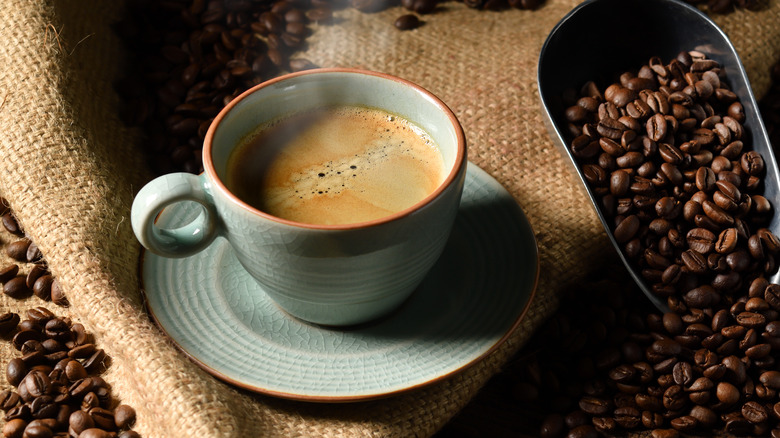Sorry, Science Can't Actually Tell Us The Best Time Of Day To Drink Coffee
If you really want to get to know someone, ask them how they take their coffee. Gone are the simpler days of regular versus decaf or dark roast versus light. These days you have to decide between drip versus pour-over, iced coffee versus cold brew, big chains versus boutique fair trade — and that's all before the milk options.
People drink coffee at different times, too. Maybe you grab your first cup of joe before work in the morning, or maybe you hold off until the afternoon so it gets you through your post-lunch crash, or maybe you're even a nighttime coffee drinker. But these options beg the question: What's the best time to drink coffee? The truth is, at least from a scientific perspective, there's no single right time to have a sip of java.
While the caffeine in coffee can spike your cortisol levels, which may make some people feel jittery, that doesn't necessarily mean you have to delay that first cup. According to Cleveland Clinic, experts say it's fine to drink coffee any time of day. How your body reacts, however, may influence your habits.
Coffee increases cortisol levels
According to the Harvard T.H. Chan School of Public Health, coffee offers a slew of health benefits, including lowering your risk of type 2 diabetes, heart disease, and even depression. Coffee's effects become more complex, though, once the hormone cortisol, which controls your stress response and circadian rhythm, enters the picture.
For most coffee drinkers, the jolt of energy that comes from that first cup is what starts the day. This timing may coincide with your body's best efforts to get you up and out of bed. Every morning, around 7 to 8 a.m., your body's cortisol levels peak. When you add an 8-ounce cup of coffee to the mix, which contains around 100 milligrams of caffeine, your body's cortisol will increase even more. If you're sensitive to caffeine, this combination might make you feel jumpy, which could explain why some health experts advise that you hold off on coffee until later in the morning or day (per Cleveland Clinic).
Some people, however, have chronically high cortisol levels. If you're one of these, be aware that a boost of caffeine will increase your already-high levels of the hormone, which may impact cardiovascular health, the American Heart Association reports.
There's no best time for coffee, but there are good times
Fortunately for coffee lovers, there doesn't seem to be a wrong time to drink this beverage. What the matter really boils down to is how you personally react to caffeine. Some folks may be able to drink coffee any time (even at night) and feel great. Others may find that they can only drink one cup in the morning — any more, and they would have to cut back. If you want to get the most bang for your buck, however, mid-morning or early afternoon seem to be the sweet spots.
Since your cortisol levels start to dip around 9:30 a.m. and 11 a.m., those are great times to head for the coffee maker. Similarly, 2 p.m. is a good time for a boost if you need help getting through the afternoon.
All of that goes out the window if you work nights, of course, or if you have the CYP1A2 "coffee gene," which breaks down caffeine and gets it out of your system quickly. If neither of these applies to you, then as long as your caffeine intake isn't preventing you from getting a good night's sleep or making you too jittery, any time is a good time for a cup of joe. Just try not to overdo it, as drinking too much coffee may eventually produce the opposite effect.


